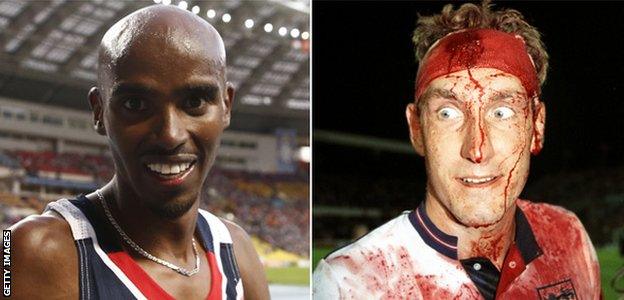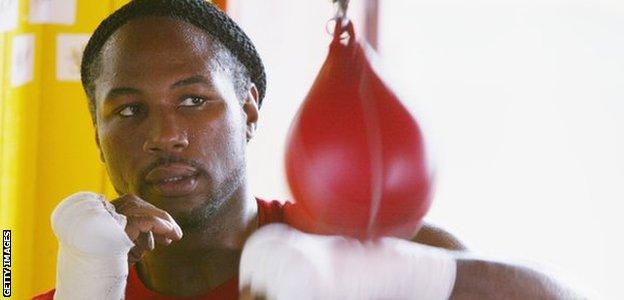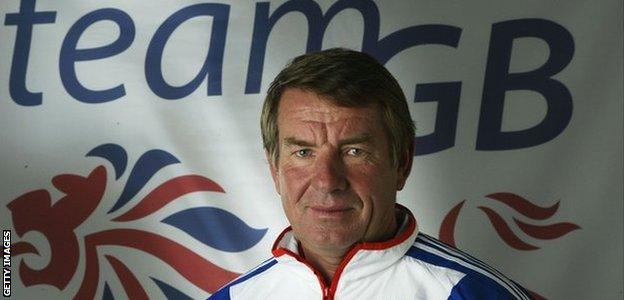Prejudice & patriotism: When is a Briton not a Briton?
- Published
Great Britain's world of sporting stars
There was disquiet across the land: a British team, winning Olympic gold, with more than half its members having grown up thousands of miles away.
The year? 1936. And while the story of GB's successful ice hockey team at those Winter Olympics - with nine of its 13-strong squad living in Canada, speaking with Canadian accents and having no memory whatsoever of Britain - has long been forgotten, the contentious issue of national identity in the country's sporting teams skates on.
Much of the debate is complicated, either by emotion or instinct, but there is one thing we can say with certainty: British teams have never, despite what the dewy-eyed and dogmatic would like to think, been the exclusive province of those born in Britain.
A lamentable dilution of the national cause? Bearing in mind the birthplaces of such quintessentially English sporting heroes as Colin Cowdrey (Bangalore, India), Ted Dexter (Milan, Italy) and Bradley Wiggins (Ghent, Belgium), probably not. The first man to win a medal for Great Britain at a modern Olympics, way back in 1896, was Charles Gmelin, born in Krishnagar, India.
Before we start battling through the politics and prejudices of who should be allowed to wear a national jersey, a little more on who legally can.
If you hold a British passport, regardless of where you were born, you are eligible. So Tour de France winner Chris Froome (born in Kenya, schooled in South Africa, with a father and grandparents all born in Britain) rides for Great Britain, with considerable pride.
The same applies to those born and raised overseas, only to subsequently move to the UK, with a British parent, as a child. Which is why Andrew Strauss (born in South Africa, moved to Australia aged six, arrived in southern England before his eighth birthday) could captain England's cricket team, why distance runner Mo Farah (born in Somalia, moved to Britain aged eight to live with his British-born father Mukhtar) wins Olympic and world doubles for Britain, why US Open golf champion Justin Rose (another born in South Africa, who moved to Hampshire aged five) is British not South African.
Having an English, or Scottish, or Welsh, parent or grandparent is enough for both football and rugby's governing bodies, regardless of which passport the player themselves might hold. Of those who immigrate as adults, footballers become eligible for their adopted nation only after five years of continuous residency. The IRB, external, rugby's governing body, stipulates a residency of just 36 months; the English and Wales Cricket Board seven years.
It's this last category that fires the most argument. Residency might legally qualify you to play for England, or Scotland, or Team GB. But what of hearts and minds? What makes someone British enough to deserve to wear the shirt or parade the flag?
Which is where the problems multiply.

Neither Mo Farah (left) nor Terry Butcher was born in the UK
Identity is a complex, often illogical sense, rather than a simple set of universal rules. If each of us were asked to define Britishness, we'd come up with 60 million nuanced versions.
It can't be purely political, or else we would have had one-party rule for the past century. It can't be a single language, or else you could count out large chunks of Wales. Cultural? Nine million people watched Downton Abbey last weekend. Millions more have never seen a single episode.
Often our feelings about a stranger's national identity are based entirely on ourselves. Is that person like me, or people that I know? Do I recognise their version of my country?
Perceptions of patriotism can be shaped by as little as accent, as much as logic. Tiffany Porter, 100m hurdles bronze medallist at this year's World Championships in Moscow, has held dual UK and US citizenship since birth. But her unmistakable American drawl has arguably made her harder for some athletics aficionados to accept, just as some boxing fans never forgave undisputed heavyweight champion Lennox Lewis (born in West Ham, raised in London) his Canadian inflection.
Lewis provides an apposite example of how many modern Britons escape neat definition. His parents were Jamaican. Having come to east London as immigrants themselves, they moved the family to Ontario when he was 12.
Lewis subsequently won both the world amateur junior title and an Olympic heavyweight gold for Canada, enough for some British fans to consider his colours forever nailed to the maple. But he says he always felt British, not least for the playground beatings his Cockney accent elicited when he first arrived in his new home, and he returned to the country of his birth as soon as he turned pro.
Then there is the charged effect of ethnicity and religion. England wicketkeeper Matt Prior, born in Johannesburg to a South African mother and English father, moved to Sussex aged 11 - three years older than Farah was when he arrived in Hounslow.
But it is under articles on the black, Muslim Farah that the comments sections are often dominated by unpleasant rows about his supposed Britishness, not those on Prior.

Lennox Lewis: His background shows how it can be impossible to neatly define nationality
This is not Prior's fault. But neither is it Farah's. He provided the perfect summation of his own identity in the moments after his 5,000m triumph at London 2012.
"This is where I grew up, this is where I started life. This is my country, and when I put on my Great Britain vest I'm proud. I'm very proud."
Why the distrust of some immigrants in a national shirt? It is sometimes as if a sportsman not born in Britain must somehow care less about the nation's fortunes, or at least care for reasons we don't personally recognise, even though the shining example of NBA star Luol Deng (born in Sudan, granted political asylum with his family and subsequently raised in Brixton) shows often it is the refugee - with the most to lose, and the most to be thankful for - who cares the most.
Why the distrust, in particular, of those who have arrived as adults?
"He's only doing it for the money," comes one complaint. That this motive should be considered detrimental in sport, when it is positively lauded in other careers that immigrants may adopt, says as much about our own attachment to the outdated amateur ideals of long ago as it does about the athlete.
It assumes someone who has come to Britain solely to play sport will somehow try a little less hard than someone born on these shores, even when the motivation of someone who has given up their life elsewhere to gamble all on a new existence could surely seldom be greater.
There is the accusation of opportunism, as if ambition were bad for a sportsman, and as if opportunism wasn't exactly the sort of talent often lauded in the arena.
Opportunism also runs both ways. Sporting governing bodies, particularly before the London Olympics, searched near and far for eligible talent, homegrown or otherwise. As a nation we wanted medals. As a nation we celebrated together when they came. So aren't we all complicit in the process, even if some might find it unsavoury?
For all the kissing of badges and draping of flags, commitment to the national cause is a nebulous thing. Who has contributed more to the country, the sports star born overseas who then helps take their adopted team to the top of the world rankings, or the British-born hero who becomes a tax exile in Monaco to protect their earnings from being ploughed back into the society that nurtured them?
Cricketer Kevin Pietersen came to Nottingham from Natal aged 20 - opportunistically, many would say, because he thought the quota system in the country of his birth would hold back his sporting ambitions., external
Next month in Brisbane, Pietersen should make his 100th Test appearance for England - more than Wally Hammond,, external more than Len Hutton,, external more than Peter May, external or Ken Barrington., external He has scored more runs across all forms of the international game than any other England player.
Little could indicate greater commitment to the cause. But when Pietersen fails to contribute with bat, or falls out with his team-mates, it is his nationality and that switch that crop up in analysis again and again. Even approaching his Test landmark there is the sense he is appreciated rather than loved by England supporters.

Foreign coaches like Jurgen Grobler have had a huge impact on British sport
Where, too, to draw impenetrable national borders?
Sporting success is only partly down to the raw abilities of players and athletes. The quality of coaching they receive can be transformative, which is why German-born Jurgen Grobler, external is held in such high esteem by the 11 British rowers he has taken to Olympic gold (many of them, as with Sir Steve Redgrave and Sir Matthew Pinsent, multiple times).
Just because Sven-Goran Eriksson and Fabio Capello failed with England's football team does not mean British sport - and thus national pride, and our collective identity - has not been well served.
To keep British teams for the British would also exclude Zimbabweans Duncan Fletcher and Andy Flower, who together did so much to take England's cricket team from a ranking above only Bangladesh to number one in the world; would mean Olympic long jump champion Greg Rutherford and Paralympic 100m gold medallist Jonnie Peacock could never have worked with their brilliant American former coach Dan Pfaff and denied six-time Olympic gold medallist Sir Chris Hoy the vital input of German Jan van Eijden and Australian Shane Sutton.
Sport reflects the wider world around it. People move, more than ever before - for love, for work, out of choice, out of desperation.
The old world, encapsulated by some in the image of blood-soaked patriot Terry Butcher, external ignoring intense pain and stern medical advice to see England into the World Cup finals of 1990, is gone, even if it ever truly existed.
Butcher's birthplace? Singapore.
Comments have now been closed on this article because of persistent abuse of the service.
- Published17 October 2013
- Published11 October 2013
- Published9 October 2013
- Published9 October 2013
- Attribution
- Published9 October 2013
- Published8 October 2013
- Published8 October 2013
- Published7 October 2013
- Published5 October 2013